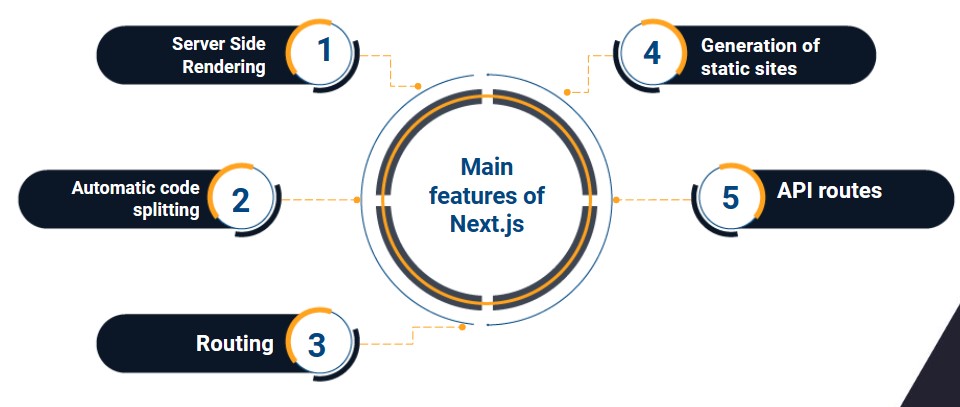Next.js's primary functionalities and commercial applications
September 04, 2023
Table of contents
Quick Access

Next.js is a popular open source framework based on React that is used to create server-side rendering (SSR) web apps. It offers a framework and set of rules for quickly developing performance-driven and scalable applications.
Developers can use Next.js to create static webpages, dynamic web apps, and mobile apps that use React and Node.js. Furthermore, Next.js streamlines the deployment process by allowing developers to deploy their apps to a variety of hosting providers and platforms such as AWS, Vercel, and Netlify.
"Under the hood, Next.js also automatically abstracts and configures the necessary tools for React, such as bundling, compiling, and more," they say on their official website. "This allows you to concentrate on developing your program rather than customizing it. Next.js can help you build quick, dynamic, and interactive React apps whether you're a solo developer or part of a larger team."

Main features of Next.js
Next.js provides several key features that make it a popular framework for building React-based web applications, which is why developer teams at software agencies have it as one of their favorites for any tech project that comes their way.
The most important features of Next.js are:
- Server Side Rendering (SSR): Next.js enables developers to create server-side rendered applications that allow web pages to load quickly. SSR in Next.js enhances website performance as well as search engine optimization (SEO).
- Automatic code splitting: Next.js automatically breaks code into smaller portions, resulting in faster and more efficient page load times.
- Routing: Next.js supports automatic routing and dynamic route matching based on file system structure, eliminating the need to create separate routing rules in separate files.

- Static Site Generation (SSG): Next.js makes it simple for developers to generate static websites by generating an optimized HTML, CSS, and JavaScript package during the development process.
- API Routes: With this open source framework, developers may include API routes in their sites that manage server logic and data retrieval.
- CSS-in-JS: Next.js includes built-in CSS-in-JS support, allowing developers to build and maintain CSS within the component.
- Next.js includes Hot Module Replacement (HMR) capabilities to help developers improve the development experience and simplify troubleshooting.
- Extensibility: Next.js is extremely extendable and offers a wide range of plugins and options that developers may utilize to tailor their apps to their own needs.
Other features that Rootstack developers highlighted when working with Next.js is the broad support community that this framework has, with thousands of ready-to-use packages that will help solve any problem that arises during the process. development, maximizing productivity.
It's also very easy to learn, which is why people just starting out in the world of programming and web development often choose Next.js for their first projects and applications.

Next.js's most common applications
Next.js is a versatile framework that may be utilized in a variety of scenarios. Here are some of the most common applications:
Websites for eCommerce
By displaying pages on the server side and dividing code into smaller bits, Next.js may provide a quick and efficient user experience for online shopping.
Websites for corporations
Next.js can be used to create dynamic corporate websites with optimized performance and manageable code.
Personal Websites and Blogs
Next.js enables developers to create SEO-friendly static or dynamic blogs that can handle rich content.
Progressive Web Applications
A framework like Next.js may be used to create fast and responsive PWAs that work offline, send push notifications, and function similarly to native apps.
Dashboards and administrative panels
Next.js is a good framework for developing dashboards and admin panels that support routing, HTTP queries, and authentication.
Websites for Social Networking
One of this framework's strengths is its ease of adaptation to the needs of a social networking site. Next.js can be used to create social networking websites that handle real-time updates, user authentication, and social sharing.
Apps for mobile devices
Next.js may be used to create React Native mobile apps, which deliver native-like performance and user experience. The combination of these two technologies enables developers to create functioning mobile applications tailored to the modern user fast and efficiently.
Overall, Next.js is a popular choice for developing online apps that require improved performance, SEO optimization, server-side rendering, dynamic content, and simplicity of development.
We recommend you on video
Related Blogs
Free Magento Commerce Features for an Online Store

How to use chatbots for e-commerce?

Which API is best for Android App Development Services

How to automate processes with Odoo software
What programming language is used with React Native?

